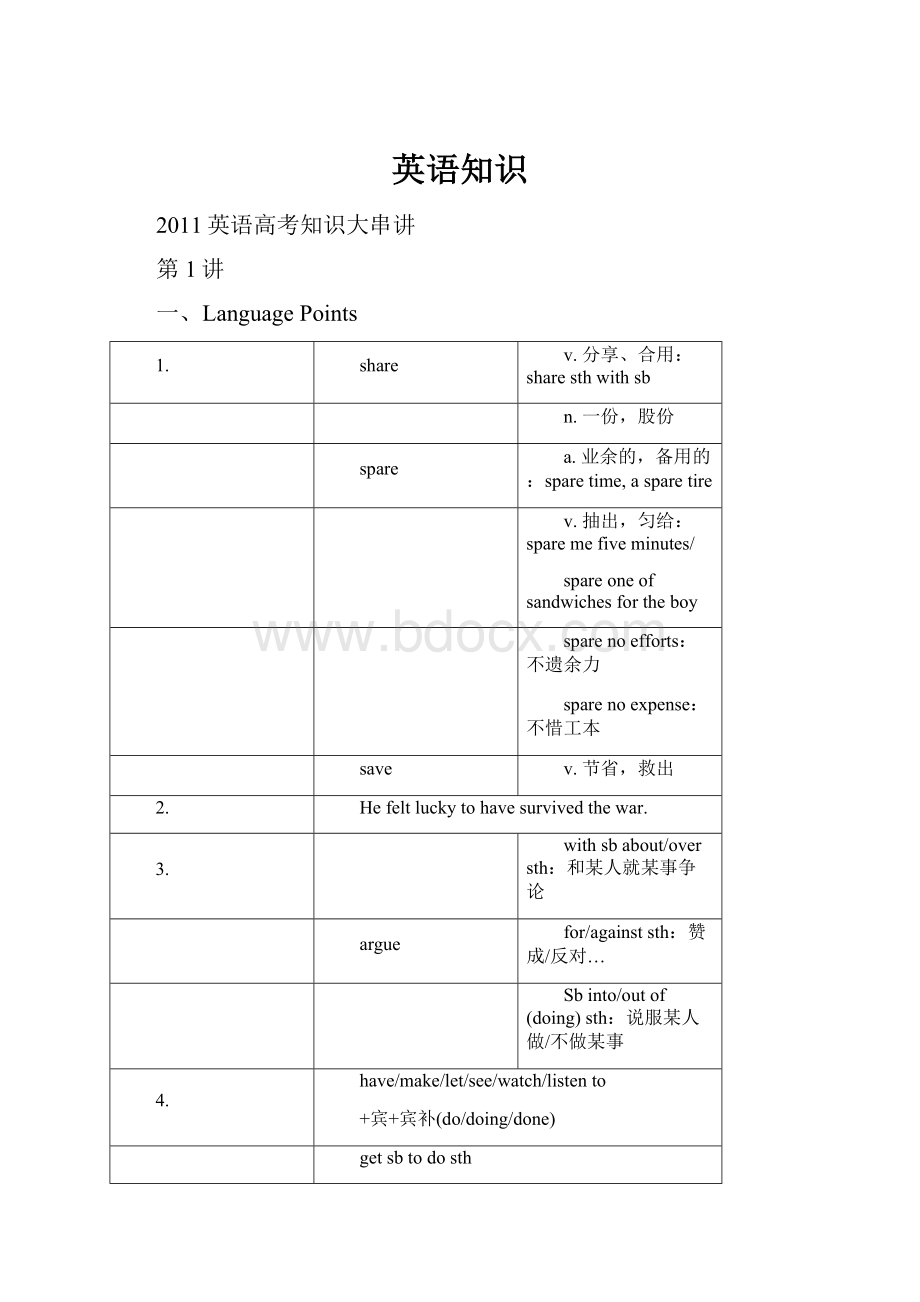英语知识.docx
《英语知识.docx》由会员分享,可在线阅读,更多相关《英语知识.docx(97页珍藏版)》请在冰豆网上搜索。

英语知识
2011英语高考知识大串讲
第1讲
一、LanguagePoints
1.
share
v.分享、合用:
sharesthwithsb
n.一份,股份
spare
a.业余的,备用的:
sparetime,asparetire
v.抽出,匀给:
sparemefiveminutes/
spareoneofsandwichesfortheboy
sparenoefforts:
不遗余力
sparenoexpense:
不惜工本
save
v.节省,救出
2.
Hefeltluckytohavesurvivedthewar.
3.
withsbabout/oversth:
和某人就某事争论
argue
for/againststh:
赞成/反对…
Sbinto/outof(doing)sth:
说服某人做/不做某事
4.
have/make/let/see/watch/listento
+宾+宾补(do/doing/done)
getsbtodosth
have+宾+宾补(todo/tobedone)
5.
So+同一主语+助动词
So/neither/nor+助动词+另一主语
Soitis/waswith+另一主语
6.
should/oughtto/need/could/might/would+do/havedone
7.
except/but/exceptfor/exceptthat/exceptwh-clause
besides/inaddition
apartfrom
butfor=without
8.
Thefirsttime+从句
Forthefirsttime:
作时间状语
It’sthefirsttime+that-clause(完成时)
thefirst+名词+todo
9.
most
mostofthe+n.(pl)/pron.
themajorityof(the)
mostly:
主要地(状)
10.
beequaltosth:
与…相等
beequalto(doing)sth:
胜任(做)某事
equalsth:
与…相等
equalsbinsth:
在…方面与某人匹敌
11.
compare…to/with…
comparedto/with…
12.
agreatmany
several/twodozen/hundred+n.(pl.)
(many)dozensof
agreatmanyof+the/these/those+n.(pl.)
seveal/twodozenof+pron.
13.
muchtoo+adj/adv(原级)
toomuch+n.(u.)
toomany+n.(pl.)
14.
没有被动态
comeabout(主要用于疑问句、否定句)
happen(表示偶然、碰巧之意)
sth+takeplace(多表示有组织、有计划)
breakout(指战争、灾害、疾病等的爆发)
occur(与happen通用)
Itoccurstosbthat/todo…:
某人突然想起…
15.
n./pron./adj./adv./prep-phrase
todo:
表将来
With+宾+宾补doing:
表正在进行
Done:
表过去
16.强调句型的判断方法:
如果将句子中的“itbe”和“that”去掉,原句通顺则是强调句,否则就不是强调句。
例:
ItwasinthestreetthatImetanoldfriendyesterday.
二、语法专题──名词的考点
1.考查可数名词和不可数名词,尤其是许多不可数名词在一定情况下变为可数名词。
2.考查名词的格,即’s所有格,of所有格或双重所有格。
3.名词作定语。
4.名词及名词短语的辨析。
5.名词与介词,冠词,动词的搭配。
三、题型归纳──辨析型单项填空
1.名词的辨析
名词的辨析首先要注意名词单复数的意义区别,如parent指父亲或母亲,而parents指父母双亲;people指人们,而apeople指民族。
其次注意可数与不可数时的意义区别,如:
exercise指锻炼;而exercises指练习题或练习操;再次,注意同义名词或近义名词的区别,如:
:
event指发生的重大事件、体育项目;incident指偶发事件;而accident指意外事件。
最后还要注意近形词的区别,如:
cloth指布;cloths指各种不同用途的布;clothes指衣服(复数),clothing衣服(总称)。
2.动词的辨析
对于动词的辨析,首先要了解动词的及物与不及物,如:
reply意为“回答,答复”后面接名词时需接介词to,此时为不及物动词;后接从句时,则为及物动词。
其次是要弄清动词的词义区别,如:
advise与persuade,前者指劝说、劝告,强调过程;而后者指说服,强调结果。
最后还要区别各种非谓语动词间的意义和用法:
动词的v-ing形式表示正在进行或伴随的动作;v-ed形式表示完成或被动;todo形式表示即将进行的动作等。
3.形容词、副词的辨析
对于形容词、副词,一是要注意近义词间的区别,如:
clever指对问题处理的圆滑;bright指对问题的反应快;wise指选择的正确等。
此外,如wide与broad;strong与powerful;interesting与interested;exciting与excited等。
二是注意同形的形容词和副词,如:
close作形容词时意为“亲密的”;作副词时意为“接近,靠拢”。
三是注意同根副词的区别,如:
hard与hardly,前者指猛烈地、努力地;而后者意为几乎不。
四是注意副词形式的形容词,如:
friendly,lovely,lively实际上是形容词,切不可当作副词使用。
五是注意形容词的位置区别,如:
present+n.与n.+present,前者指当前的;而后者指在场的。
4.介词的辨析
对介词的辨析要从两方面入手,一是介词的词义,如:
across,through,past,over为动作介词,across强调从表面横过,越过;through强调从空间穿过;past强调从侧面、旁边经过;over强调从空中越过而不接触,也可以表示越过一段距离、空间等。
此外,如above,over,on;with,by;of,to;to,for的区别。
5.连词的辨析
连词的区别主要在于:
一是连词的意义,如:
when,while与as;because,since与for;whether与if;though,as与although等。
二是注意时间名词短语转化而成的连词,如:
every/eachtime;thefirst/second…time;themoment;theminute等,它们都可作连词,连接从句。
三是注意副词转化而成的连词,如:
directly,immediately,instantly等。
四是注意连词的词序,如:
onlyif与ifonly,前者意为“只要”,后者意为“要是…就好了”。
6.代词的辨析
代词的辨析包括不定代词,如:
other,others,theother,theothers,another等;人称代词,如:
one,it,that等和关系代词,如:
which与that;which与as;whose与prep.+which/whom等。
1.Doestheteacher____youtogohomethisweekend?
A.allowB.consentC.agreeD.approve
2.Afterthebigfire,thehousewascompletely____.
A.ruinedB.destroyedC.damagedD.spoiled
3.Thehuntersaidhewasluckytogetoutoftheforest____.
A.livingB.aliveC.livelyD.live
4.____talkingwithhisGrandma,hewentawaywithoutsayingaword.
A.TiringwithB.TiringofC.TiredwithD.Tiredof
5.It’snecessarytohavesome____knowledgeforthisjob.
A.electricB.electricalC.elctronD.electricity
6.Thephoto____onthewallwastakeninBeijinglastyear.
A.hangB.hangingC.hungD.hanged
7.OnNewYear’sDay,people,especiallygirls,alwayswearnew____-newhats,newcoats,newtrousersandnewshoes.
A.clothesB.clothingC.clothD.cloths
8.Hestaysup____intheeveningstogoonlinetogetthe____information.
A.late,latestB.lately,lastC.late,lastD.latest,latest
9.____isittoaskheraboutheraboutthat?
Shedoesn’tknowiteither.
A.WhatgoodB.HowgoodC.WhatagoodD.Howmuchgood
10.____IhaddoneitIknewIhadmadeamistake.
A.HardlyB.DirectlyC.mostlyD.Nearly
11.ItissaidyouwenttoseeJennyyesterday.Whathasbecome___her?
A.fromB.ofC.intoD./
12.Whodoyouthinkwillbeallowed____theretomorrow?
A.visitB.tovisitC.visitingD.visited
13.TodaywecaneitherflytoHainanIslandortakeaship___thesea.
A.inB.acrossC.frominD.acrossfrom
14.Youwilfindwhatgreatbenefitthecomputeryouowncanbe____eachtimeyouuseittohelpyouwork.
A.forB.ofC.atD.on
15.Ithoughthewasnot____ofaprofessorthefirsttimeIheardhimspeakingtothechildrenattheplatforminthehallofourschool.
A.somethingB.anythingC.somebodyD.anybody
16.We’vemissedthelastbus.I’mafraidwehaveno____buttotakeataxi.
A.wayB.choiceC.possibilityD.selection
17.____studentshavegraduatedfromthisschoolinthelasttwentyyears.
A.TensofthousandsofB.Tensuponthousandsof
C.TensinthousandsD.Tenthousandsof
18.Thefarmersplantoproducethreetimes____intheyearbeforelasttomeettheincreasingneedofthepeople.
A.ofcropasmuchthisyearasB.asmuchcropthisyearas
C.asmorecropthisyearasD.muchcropthisyearthan
19.Ithinkthehouseis____largeforafamilyoffourpeopleandthepriceisveryreasonable.
A.tooB.ratherC.fairlyD.alittle
20.Hismotherdislikeshim,forhe____lies.
A.tellsB.isalwaystellingC.hastoldD.alwaystold
1-5ABBDB6-10BBAAB11-15BBDBB16-20BABCB
第2讲
一、Languagepoints
1.sb./sth.+adj/n
sb./sth.+todo
consider(以为,认为)+sb./sth.+as
that-clause
n.
consider(考虑)+doing
疑问词+todosth
“把…当作…”的译法:
consider…as
=thinkof/lookon/take/regard/treat/have…as
2.todo
Away+ofdoing
(that/inwhich)+定语从句
Amethodofdoingsth
bythismeans
Youcansolvetheproblem+withthismethod
inthisway
bymeansof:
通过…方式,以…手段
bythis/thatmeans:
通过这种/那种方式
byallmeans:
务必,一定;(用于回答)当然行,请
bynomeans:
决不,一点也不(用于句首时用倒装)
3.protect…(from)doingsth
prevent/stop…(from)doingsth
keep…fromdoing
keep…doing
underthepotectionof…
4.aswell
aswellas
might/mayaswell=hadbetter
5.todo
specially+for-phrase
especially
6.alongtheriver:
沿着河流
overtheriver:
在河的正上方
throughtheforest:
穿过森林
bytheriver:
在河边
onthebank:
在河岸上
7.followtheinstructions
followone’sadvice
asfollows
8.beresponsibletosbforsth
9.n.
doing/todosth
sbtodosth
prefer+sthtosth
doingAtodoingB
todoAratherthandosth
thatsb(should)dosth
10.n.+after+n.=one+n.+afteranother
一个接一个(强调动作的重复)
n.+by+n.:
一个接一个(强调动作的变化)
treeaftertree/daybyday
11.say“hi”tosb.
Pleaseremembermetosb.
向“某人”问好Sendmyregardstosb.
Sendthebestwishestosb.
12.主+be+adj.+todo:
不定式一般用主动式,与主语存在逻辑上的动宾关系,所以当不定式的动词是不及物动词时,则应在其后加上适当的介词。
主+be+adj.+todo=Itbe+adj.+(for/ofsb)+todosth
eg.Thisquestionisdifficulttoanswer.
=It’sdifficulttoanswerthequestion.
Themanishardtoworkwith.=It’shardtoworkwiththeman.
当不定式用作定语时,与其所修饰的词之间存在逻辑上的动宾关系,且主语为该动作的执行者时,也常常用主动形式。
Eg.Hewantswatertodrink.
Shehasaroomtolivein.
IwillgotoBeijingtomorrow.Doyouhaveanythingtobetakenthere?
二、语法专题──冠词的考点
1.考查冠词的一些基本用法,例如:
复数名词、不可数名词表示泛指不用任何冠词;the+单数名词表类指;a/an+单数名词表泛指。
2.考查冠词的习惯用法。
如:
incaseoffire,bewoundedintheleg,onthetelephone,leavecollege等。
3.考查冠词的活用。
如:
抽象名词的具体化,asuccess;a/an+专有名词表泛指,anEdison。
4.考查零冠词的用法。
三、题型归纳──结构型单项填空
结构型试题常表现在句子中某些成分的省略、标点符号的出现、倒装或插入其他成分使前后分离等,从而引起句子结构的变化,扰乱对句子的判断。
1.有省略的复合句。
由于宾语从句或定语从句中谓语部分行为动词的省略,导致对不定式作状语产生误解。
2.标点符号的影响。
由于受汉语习惯的影响,往往会因为句子中的标点符号,弄错句子的结构。
3.插入语的影响。
有些句子由于中间插入了某些成分,而使句子显得支离破碎,造成对句子结构的误解。
4.倒装句型的基本结构:
(1)完全倒装;
(2)部分倒装:
1)在特殊疑问句和一般疑问句中;2)so/neither/nor+do/be/have/情态动词+主语;3)当虚拟语气的条件从句中省略if时,were,had,和should应置于句首,采用倒装结构;4)表示祝愿的句子:
may+主语+动词原形;5)as,though引导让步状语从句时:
提前部分+as+主语+谓语动词;6)表示否定意义的副词、介词短语和连词词组置于句首;7)当notuntil+时间状语从句置于句首时,主句应采用倒装结构,而从句仍用正常语序;8)notonly…butalso…连接两个句子时,第一个句子采用倒装结构,第二个句子不采用倒装结构;9)nosooner…tham…,hardly…when…,scarcely…when…都表示“一…就…”,强调过去的两个动作接连发生,当nosooner,hardly和scarcely置于句首时,主句常把had置于主语之前,采用倒装结构,但从句不倒装。
10)only+副词/介词短语/宾语/时间状语从句置于句首时,常采用倒装,但only+主语则不应采用倒装;11)在so/such…that…引导的结果状语从句中,将so+adj./adv.或such置于句首时,其主句常采用倒装结构。
5.强调句型,感叹句,并列句的应用。
6.独立主格结构。
1)n+todo;2)n+doing;3)n+done;4)n+prep.+n.;5)n+adj/adv;6)n+n;7)with+n+todo/doing/done/adj/adv/prep+n.
1.Hesaidhewoulddowhathecould____us.
A.helpB.tohelpC.helpingD.helped
2.Hespentallthemoneyhehad____thatdictionary.
A.buyB.tobuyC.buyingD.bought
3.Therearemorethanthreethousandstudentsinmyschool,mostof____fromthecountry.
A.thatB.whichC.whomD.them
4.Itishiscleverness,nothisstrenth,____defeatedhisrival.
A.thatB.whichC.whatD.who
5.Thewayyouthinkof_____ourlivingconditionssoundsreasonable.
A.improveB.toimproveC.improvingD.improvement
6.Ifeelstronglythatwhateveryou____mattertome.
A.don’tB.dodoesn’tC.don’tdoD.doesn’tdo
7.Isthisschool____youstudiedintwoyearsago?
A.thatB.whenC.itD.theone
8.Pleasetellmethewaythoughtof____thegarden.
A.takecareofB.totakecareof
C.takingcareofD.howtotakecareof
9.MrWangwasmuchdisappointedtoseethewashingmachinehehadhad____went